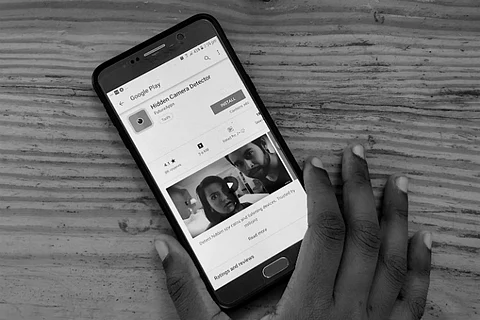

The recent discovery of hidden cameras in the rooms of a women’s hostel, placed by its owner in Chennai, sent shockwaves across the city. The incident has highlighted the need to find ways to detect cameras placed in secret.
The incident also prompted the District Collector of Chennai to issue a circular which acknowledged that women – students and working women – end up staying in hostels that are not registered with the district administration. The circular also listed 15 points which are to be followed by the hostels across the city. One of the instructions in the circular directs women to make use of the mobile apps available on the internet to detect hidden cameras in a room and proceed to give complaints in case cameras are found in their rooms.
TNM spoke to app developers and security experts about these spycam detection apps to find out more about the technology and whether they actually work.
Are these apps foolproof?
“It depends on the app,” begins Sidhdharth
“Cameras emit infrared rays which can be detected using the lens of another camera, for example, the camera of a smart phone. This technology is mostly used in spycam detection apps that are available. However, advanced spycams emit radio frequency rays, which cannot be detected by a mobile phone camera. In such cases, a separate device called the bug detector becomes helpful,” he says.
'Most spycam detecting apps serve the basic purpose, which is to detect rudimentary cameras that use IR rays. But it is not advisable to totally bank on those apps," adds Sidhdharth.
Deep Chanda, a senior employee in Network Intelligence and a cybersecurity professional with 15 years experience, agreed with Sidhdharth. “To be very honest, 100 percent accuracy is impossible to achieve in such apps. The apps that are available in the market do not have such great reviews either. There is no concrete technology to make sure that someone can get full assurance regarding detection of spycams.”
Deep also adds cybersecurity is risky since people with bad intentions only need the IP of the device to turn the camera on. “Technology can never be completely foolproof. Even the paid antivirus that you use do not protect the device 100 percent. When we think that we have achieved full security against threats, the very next day we will have another virus that is making our lives hell. Technology is that dynamic and fast,” he says, shedding light on the practical difficulties faced by tech developers.
Deep adds that no apps are a hundred percent effective. "At most, they are 50 percent effective. It is always best to use a mix of human checks and technology in these issues," he says.
Do spycam detector devices work?
When compared with mobile apps for detecting hidden devices, experts say that bug detectors built for the specific purpose show better results. These devices are available in the market and cost anywhere between Rs 1,500 and Rs 10,000. "There are quite a few Chinese products and branded products of bug detectors available in the market. The higher-end versions of the detectors are much more advanced in their technology that is used in revealing hidden cameras. Some of them even detect other kinds of bugs, like hidden mics, recorders and the like," says Sidhdharth.
Vigneshwar, an app developer who works with The Katalyst, a Chennai-based business and brand development company, says that the detection apps and devices have a distance and a wavelength threshold beyond which it will not detect bugging instruments. "It is not like you can switch the app or the instrument on in a room and expect it to catch the spy device. Just like our WiFi routers, the mobile apps and devices to detect hidden spyware also have a threshold distance within which it will detect the presence of spyware. And those distances are usually within centimetres. So it is safe to say that we need to take the app or the detector as close as possible to the point where the spyware is hidden, like plug sockets," he adds.
He added that the mobile apps to detect spyware work on the basis of the hardware of the mobile phone into which it is downloaded. "Most of these apps need a magnetometer to work. Not all smartphones have it in them. So the specs of the mobile device also matters, if you want the app to work," he adds.
What is the solution then?
Deep says that as a cybersecurity professional, it is best to personally verify the area for hidden devices. “I suggest human checks to make sure there are no live cams in the area. For instance, when you check in at a hotel, please check the corners of the rooms, electrical fittings, curtains, etc., yourself to be sure,” he adds.
Sidhdharth adds that smartphone hacks can be used to detect hidden cameras. “It is best to use the mobile phone camera to our advantage and basically scan the room carefully once. IR rays are visible through the lens and will be caught by the mobile camera.” He also recommends making calls from near plug points to detect hidden devices. “If you suspect cameras are fixed inside plug sockets, then go near it and use your phone to call someone. Observe if there is a disturbance in the connection. This could provide a clue towards spycams,” he says.
However, he adds that these are extremely basic steps to safeguard oneself from such cameras. “Considering hostels, they can bring a protocol or regular checks by the management or an independent agency where detector tools are used professionally to find cameras that are hidden,” he adds.